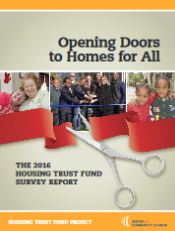2016 National Survey of Housing Trust Funds Released

The Housing Trust Fund Project of the Center for Community Change has released the 2016 National Survey of Housing Trust Funds report, entitled: “Opening Doors to Homes for All”. The survey collected data from every state housing trust fund and many city and county housing trust funds. We added cumulative selected data from city and county housing trust funds resulting from state enabling programs.
There are now more than 770 city, county and state housing trust funds operating throughout the United States providing in excess of $1 billion in funds in 2015 to support affordable homes.
“Access to affordable homes is a necessary and fundamental aspect of every viable community and housing trust funds demonstrate that this is an achievable goal if we commit the resources to make it a reality”, encourages Mary Brooks, author of the report. Housing trust funds operating in all kinds of environments have been creative and successful in providing safe affordable homes for everyone.
The report summarizes the findings from surveying how state, city, and county housing trust funds are operating throughout the country, including state enabling legislation for local housing trust funds present in more than ten states. The Housing Trust Fund Project selected to highlight seven critical trends that housing trust funds are advancing to ensure affordable homes become an asset to every community. These are: providing homes for extremely low income households; preserving the investment in affordable homes; responding to the national call to address homelessness; addressing gentrification and displacement; addressing rural housing needs; addressing environmental goals; and highlighting the success of housing trust funds.
Forty-seven states plus the District of Columbia have housing trust funds, with a few states having more than one. Not all states have dedicated, ongoing sources of revenue. The top two sources of dedicated public revenue for state housing trust funds are a real estate transfer tax or document recording fees. Slightly more than half of the state housing trust funds are administered by state housing finance agencies, while most of the others are administered by a state agency or department.
City housing trust funds exist in 35 states. The most common dedicated source of public funding for city housing trust funds are developer impact or linkage fees and inclusionary zoning in-lieu fees, followed by property taxes. Many other sources have been secured by cities including tax increment districts, land sales, bond revenues, and taxes on hotels/motels and short-term rentals. County trust funds exist in twelve states, the vast majority using document recording fees as their primary source of revenue.
A few additional highlights from the focus on the highlighted trends:
- Serving extremely low-income households: Serving the lowest income households and the homeless was the most common item listed for receiving points during an evaluation process for awarding funds. Setting aside funds to serve a specific purpose is a strong measure within housing trust funds to ensure specific goals are met: eight state, six city, and six county housing trust funds set aside funds to serve this population.
- Preserving the investment in affordable homes: Eight housing trust funds require permanent affordability for the housing they support and another 20 have at least 50-year affordability periods. Along with support for community land trusts, this is a trend that more housing trust funds are paying attention to.
- Responding to the national call to address homelessness: While a handful of housing trust funds are committed entirely to serving the homeless population, more than an additional 20 funds set aside resources for serving the needs of and providing housing for the homeless population. Homelessness was also frequently identified as a priority consideration or applicants were given extra points in the process for awarding funds.
- Addressing gentrification and displacement: Several housing trust funds set aside dollars to preserve existing rental housing or even more gave a priority to activities in specific neighborhoods undergoing or threatened by gentrification. This trend is definitely receiving more attention, along with supporting affordable housing near transit.
- Addressing rural housing needs: Twelve states have set-asides for housing in rural areas in thirteen operating state housing trust funds. In addition, some of the state enabling initiatives ensure that every county in the state receives funds.
- Addressing environmental goals: To advance environmental goals, housing trust funds increasingly reported supporting energy efficiency improvements through energy and water upgrades, incorporation of renewables, energy audits, and requiring benchmarks on the energy and water use of properties. Some housing trust funds reported coordinating with local utility programs to save costs through efficiency programs.
- Highlighting success: The Housing Trust Fund Project has long advocated for housing trust funds to be intentional in highlighting the broad impact success with affordable housing can have within a community. Housing trust funds across the country shared numerous stories and creative ideas for doing so.
The Housing Trust Fund Project appreciates the response from housing trust fund administrators across the country in making this report possible. The Housing Trust Fund Project is very grateful for support from these foundations: The Ahmanson Foundation, the Butler Family Fund, and the Oak Foundation. In addition, the National Resources Defense Council, The National Housing Trust, and Grounded Solutions Network made significant contributions to the analysis of the survey.
The Housing Trust Fund Project continues to offer its technical assistance to housing trust fund campaigns across the country as it has done since the mid-1980s. This technical assistance program has been utilized by hundreds of campaigns and the Project staff supports both convenings and on-going initiatives to advance the capacity of affordable housing/homeless advocates to impact housing policy across the country. For more information, go to: www.housingtrustfundproject.org



